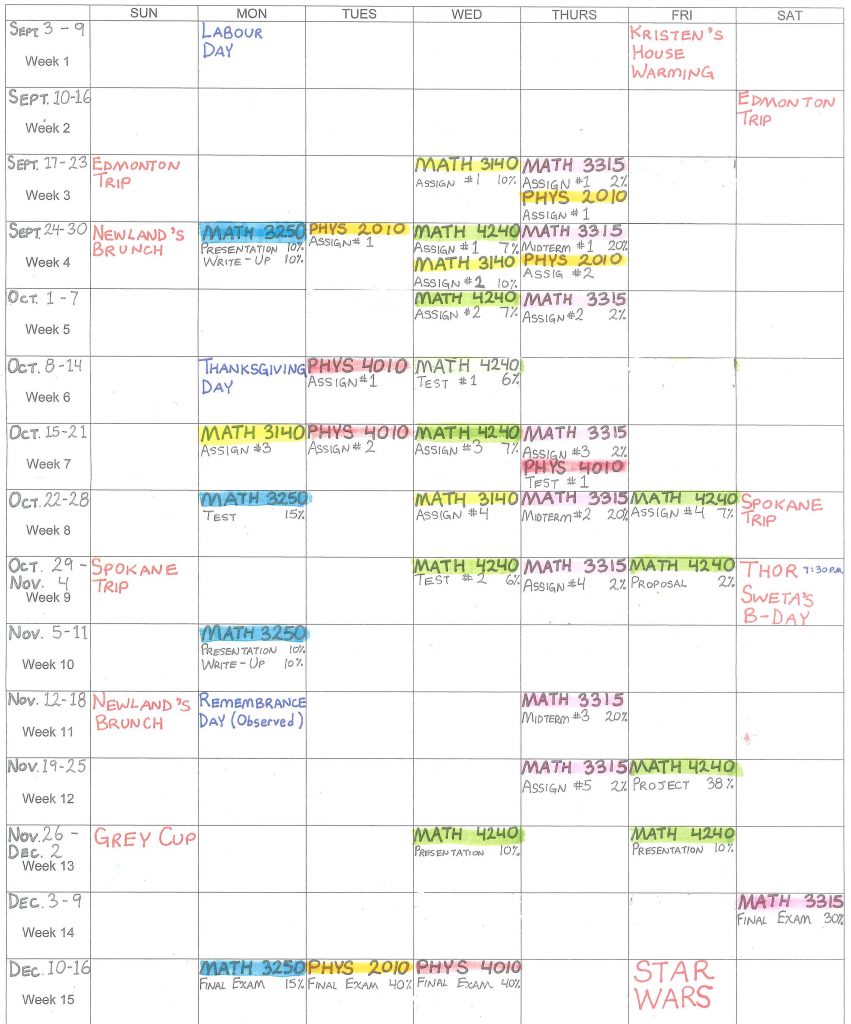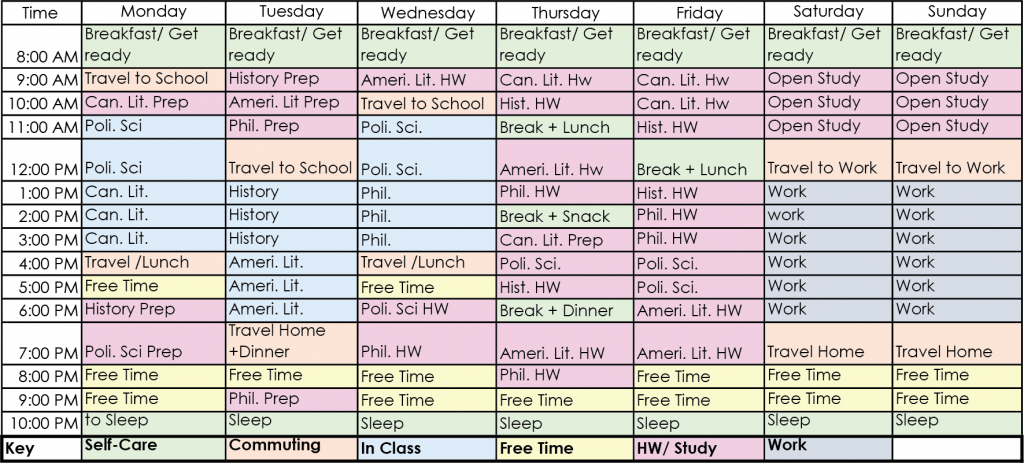4 Manage time for independent learning
Learning Objectives
By the time you finish this chapter, you will be able to:
- Understand how to allocate time for your courses to contribute to your success.
- Describe how semester and weekly schedules can help you manage time.
Many international students have busy lives. This is especially true if you plan on working or volunteering while you study. How can you balance multiple commitments successfully?
First, it is important to remember your long-term goals, and prioritize your studies. After all, your main job — and the one that supports your long-term success — is being a student. If you are taking three courses, this means scheduling between 27-35 hours for weekly study. If you are taking more than three courses, you will need additional study time. How can you be sure that you can balance your commitments effectively, while maintaining a healthy lifestyle?
Use Schedules for Planning
Semester Schedules
A semester schedule gives you a visual picture of the assignments, projects, tests, exams, and field trips that will happen during the semester. If you are taking a number of classes, this is a tool to be able to see what is coming up next.
A semester schedule includes important assignments, tests, exams, and other key events that will happen in your life during the next months. You may wish to use colour to indicate different classes, or to distinguish between your academic events and personal events.
Look at the example semester schedule below. What do you notice about what the student chose to include? What will you include on your semester schedule?

Weekly Schedules
Your next step is to create a weekly schedule. This will include your class times and any regularly schedule commitments. A weekly schedule is a good tool to evaluate whether your time use allows you to meet your overall goals. Do you have enough time for study? Is there time to maintain a healthy lifestyle?
The following principles will guide you as you create your weekly schedule:
- Record class and lab times in appropriate day/hour blocks on a time schedule sheet.
- Record travel times to and from the university and between classes.
- Record meal times, family times, laundry times, etc.
- Record all regularly scheduled personal activities such as meetings, employment and athletics.
- Record any special activities you need to do or want to do on a regular basis.
- Schedule a preview time (30 minutes) immediately before each class whenever possible. During the preview, review all or some of your notes in preparation for the upcoming class. If you have two or three classes in a row, preview from last to first class.
- Schedule a review time immediately after your classes (30 minutes) whenever possible. Use this time to edit and summarize your notes. You can also look over any assignments that were given and begin to plan when and how you will do them.
- Schedule intensive pre-reading / study / review time for each class. Try to schedule some study time each day for each class. Learning is more effectively and efficiently accomplished in shorter regular sessions than in longer irregular sessions. Also, use more of the day (i.e. morning, afternoon) for studying. Pick the times of days when you are most alert.
- Schedule to start your study period with the courses you like least or that you’re not doing well in. Try to study the same subjects at the same time each study day. Although this seems to be a mechanical way of scheduling, you will find that such a routine can help you develop a pattern for efficient and effective learning.
- Schedule a weekly review (WR) for each course. Do it at the end of the week if possible. This weekly review gives you an opportunity to go over the past week’s notes along with the reading assignments to see what you have been learning in the past week during class and study time for each course. You can also look ahead to plan the next week and determine how much reading you need to do, what projects are due, and if any tests are scheduled.
- Keep open some time for daily physical activity. Remember, research indicates that regular exercise will not only give you a general sense of well-being, but can reduce tension and help you accomplish a tough class, study, and work schedule.
- Label some empty blocks of time as OPEN for academic or personal needs.
- Schedule some time during Friday, Saturday, and Sunday for you to play, relax, or do whatever you want to do. This is your reward for sticking to your schedule. In addition, you’ll enjoy your free time more. Because it is scheduled you do not need to feel guilty.
Here is an example of what a completed weekly schedule might look like:

When to Create Schedules
Creating semester and weekly schedules is best done at the first week of each semester. You will be able to pick up a paper copy of these tools at any KPU Learning Centre. You can also download semester and weekly schedules from the links below.
- Semester Schedule Planner
- Semester Schedule Planner (11×17)
- Weekly Schedule Planner
- Weekly Schedule Planner (11×17)

